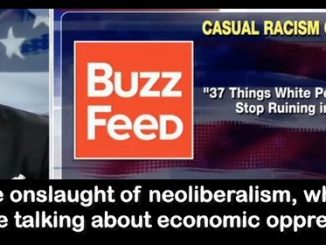
The Weaponization Of The Term “Far Right”
Economist Thomas Sowell once said that the word ‘racism’ is like ketchup: it can be put on practically anything.
Today, since Robin DiAngelo et al have decided that all white people are racist, it could be argued that the word has lost some of its power; if we’re all racist, then calling us just that isn’t particularly effective. And if we’re all unconsciously racist, perhaps we’re all victims, and thus should be the target of sympathy, not anger. Or not: Ms. DiAngelo’s and her anti-racist disciples’ claptrap has been brilliantly taken apart by the esteemed linguist and author John McWhorter.
But the term far right hasn’t been watered down nearly as much as the ‘r’ word. And when most people hear far right, they likely think of Nazi flags, white supremacists, ultranationalists, etc. So, if you are eager to wound an individual’s or a group’s reputation, the term is most certainly a useful one.
Indeed, like its close cousin – the neologism ‘alt right’ – far right has become an effective tool for those in the media and politics, used to discredit and smear people who they consider a threat, or with whom they merely disagree. A recent example of this is the anti-lockdown protests that took place in Dublin, Ireland on February 27, 2021.
Dublin Drama
Reports have varied, but anywhere from 400 to 4,000 people took to the streets of Dublin to demonstrate against what have been considered the most draconian lockdowns in Europe. This third Irish lockdown has been enforced since late December and may last until June. When one reckless individual at the protest decided to point fireworks at the Irish police (An Garda Síochána, or ‘the Guards’), unfortunately further violence broke out. Predictably, the ugly scenes that followed dominated the news headlines, rather than the core issue: people protesting against their de facto mass incarceration, and the collateral damage caused by continual lockdowns.
Papers pounced, using loaded language like “anti-lockdown protesters stormed Dublin city centre.” One elected Irish official referred to the protest as a ‘riot’. And the always-effective smear would soon be utilized, too. Extra.ie proclaimed “far right thugs attacked frontline Gardai policing an illegal protest.” The Irish Mirror declared “far right anti-lockdown protesters thronged the city flouting Covid-19 restrictions.”
How reporters managed to sit down with protesters and learn about their respective political leanings is not only incredibly admirable – it is journalism of the highest standard. Of course, these journalists did no such thing. Were some of those in attendance right wing? Yes. That a) doesn’t necessarily make them far right, and b) doesn’t warrant labelling the protest a ‘far-right demonstration’ like some Irish politicians have. A significant number of Irish citizens decided to stand up and speak out against what is widely considered a cruel lockdown. That doesn’t make all of them extremists. Quite the opposite: it is likely that many are desperate and feel that protesting is their only option.
Interestingly, in videos posted online, Irish Republican flags can also be seen among the crowds in attendance. Irish Republicans tend to lean left on the political compass, and often describe themselves as socialists, in keeping with the political leanings of the leaders of the Easter Rising. The likely reality is that the people protesting came from different political backgrounds, and many – if not most – were probably apolitical, like the majority of people tend to be. By using the term far right to describe the march, reporters and politicians are smearing the ordinary, non-violent people who have genuine concerns about the latest level-5 lockdown: a 5km travel limit, no guests on private or rented property, no family gatherings in any setting, the forced long-term closure of “non-essential” businesses, and fines and/or jail time for some who break the rules.
“Far Right” as an Ad-Hominen
No matter how rational or cogent one’s arguments are, the term formerly reserved for fascists and neo-Nazis will always be on standby, ready to be used by the writer or politician taking aim. Canadian clinical psychologist Jordan Peterson – a man who has lectured on fascist and socialist totalitarianism – has been referred to by critics as “a far-right boogeyman riding the wave of a misogynistic backlash.”
YouTube has given a platform to progressive, socialist, communist, anarchist, conservative, classically liberal, libertarian, and centrist voices. But according to an academic paper released last year, most YouTubers are far right. The Southern Poverty Law Centre has painted Sam Harris – a self-described liberal – as “a gateway to the alt (far) right.” Conservative political commentator Ben Shapiro has recently been called a “far right gadfly” by the ‘youth culture’ magazine Uproxx. For those who don’t know, Mr. Shapiro is Jewish; Jews and neo-Nazis tend not to get on very well. But that doesn’t really matter, because according to Wikipedia – with its approximately 46 million articles accessed by 1.4 billion unique devices every month – far-right politics includes ideologies or organizations “that feature aspects of chauvinist, xenophobic, theocratic, racist, homophobic, transphobic, or reactionary views.” Good luck finding widespread agreement on what constitutes each of those terms. In any case, with such a wide net, it shouldn’t be difficult to lump people and groups under the undesirable umbrella.
Given how the term far right is beginning to be spread like ketchup, perhaps it will soon lose its effectiveness in smearing individuals and groups. But as the above example of the Dublin anti-lockdown protest shows, it is still a useful weapon used by the media and political establishment: tarnish aspects of a protest as far right, and you essentially tarnish the entire protest – one that was reasonably justifiable.
The sooner all of us smell the BS, the better; with such broad, divisive, and potentially damaging terms used so liberally against individuals and groups, rational dialogue between people who disagree may become even more of a rarity.
************
Source

••••
The Liberty Beacon Project is now expanding at a near exponential rate, and for this we are grateful and excited! But we must also be practical. For 7 years we have not asked for any donations, and have built this project with our own funds as we grew. We are now experiencing ever increasing growing pains due to the large number of websites and projects we represent. So we have just installed donation buttons on our websites and ask that you consider this when you visit them. Nothing is too small. We thank you for all your support and your considerations … (TLB)
••••
Comment Policy: As a privately owned web site, we reserve the right to remove comments that contain spam, advertising, vulgarity, threats of violence, racism, or personal/abusive attacks on other users. This also applies to trolling, the use of more than one alias, or just intentional mischief. Enforcement of this policy is at the discretion of this websites administrators. Repeat offenders may be blocked or permanently banned without prior warning.
••••
Disclaimer: TLB websites contain copyrighted material the use of which has not always been specifically authorized by the copyright owner. We are making such material available to our readers under the provisions of “fair use” in an effort to advance a better understanding of political, health, economic and social issues. The material on this site is distributed without profit to those who have expressed a prior interest in receiving it for research and educational purposes. If you wish to use copyrighted material for purposes other than “fair use” you must request permission from the copyright owner.
••••
Disclaimer: The information and opinions shared are for informational purposes only including, but not limited to, text, graphics, images and other material are not intended as medical advice or instruction. Nothing mentioned is intended to be a substitute for professional medical advice, diagnosis or treatment.





